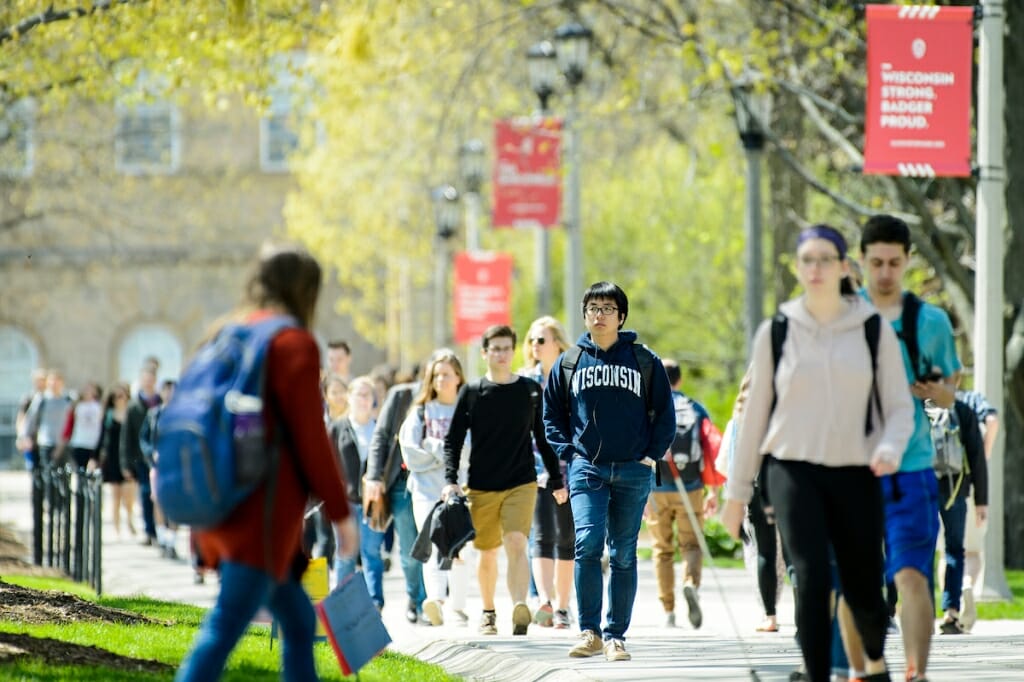UW-Madison helps launch national effort to increase college access and equity

Students walk down the sidewalk of Bascom Hill during spring at the University of Wisconsin–Madison on May 4, 2017. (Photo by Bryce Richter / UW–Madison) Photo: Bryce Richter
MADISON – UW–Madison is participating in a massive new effort in which 130 public universities and systems will work together to increase college access, close the achievement gap, and award hundreds of thousands more degrees by 2025.
The participating institutions will work within “clusters” of four to 12 institutions to implement innovative and effective practices to advance student success on their campuses. Collectively, the institutions enroll 3 million students, including 1 million students who receive Pell Grants.
UW-Madison is working with the Big Ten Academic Alliance cluster, along with seven other Big Ten schools. It is represented by Jocelyn Milner, vice provost of academic affairs, and Steve Cramer, vice provost for teaching and learning.
The Association of Public and Land-grant Universities (APLU), is organizing the collaborative effort, known as Powered by Publics: Scaling Student Success.
Powered by Publics represents the largest ever collaborative effort to improve college access, advance equity, and increase college degrees awarded. In addition to committing to those goals, participating institutions have pledged to share aggregate data demonstrating their progress to help spur lasting change across the higher education sector.
“The creation of UW–Madison as a public state university has made a college degree accessible to all state residents for more than 150 years. The spread of public universities has been clearly linked with U.S. economic growth,” said UW–Madison Chancellor Rebecca Blank. “UW–Madison has launched a series of recent initiatives to ensure that the state’s flagship remains accessible for all those who are qualified to attend. Participation in this effort should further that goal.”
Recent UW–Madison efforts include Bucky’s Tuition Promise, which guarantees four years of scholarship aid to cover tuition for Wisconsin students from low- and moderate-income families, and help for first-generation students who transfer into UW–Madison.
“Over the past few years, we’ve witnessed a real and growing enthusiasm among public university leaders to advance college completion nationally,” said APLU President Peter McPherson. “We have to seize the moment and mobilize institutions to improve not just college access, but also equity in student outcomes and the number of students who earn degrees. That’s what Powered by Publics is all about and why we’re thrilled to work with our member institutions toward such an important national goal.”
By design, the participating institutions reflect a wide array of institutional characteristics such as enrollment, student demographics, regional workforce needs, and selectivity. The broad diversity of the institutions is intended to help create a playbook of adaptable student success reforms that can be adopted and scaled up across a variety of institution types, including those with limited resources.
The clusters have identified anticipated focus areas for their work. The focus of the Big Ten cluster will be retention and persistence. “We identified several common action steps, still to be fleshed out, in the areas of building on our successful efforts to increase need-based aid for under-resourced students, continuing enhancement in academic and career advising, and studying and improving policy and practice related to stop-outs and drop-outs,” Milner said.
Another cluster expects to work collaboratively to integrate data collection systems across each of their campuses to better monitor student progress and make data-informed decisions. A cluster expects to tackle financial aid and student financial literacy, while a separate cluster is planning to work to integrate career advising early into a student’s academic journey to both speed students’ path to a degree and better prepare them for the workforce.
The effort will be overseen by APLU’s Center for Public University Transformation, which the association created this year to help drive transformational change across the public higher education sector. A core value of the Center and its participating institutions will be rooted in a commitment to sharing data and innovative, successful practices to help drive progress across the entire sector of public higher education. The Center will regularly disseminate lessons learned from the participating institutions to the broader public higher education community.
A national advisory council of respected higher education thought leaders will provide a strategic vision and guidance for the Center, which will work to build upon and complement existing initiatives around institutional change and student success.
APLU is a research, policy, and advocacy organization dedicated to strengthening and advancing the work of public universities in the U.S., Canada, and Mexico. With a membership of 238 public research universities, land-grant institutions, state university systems, and affiliated organizations, APLU’s agenda is built on the three pillars of increasing degree completion and academic success, advancing scientific research, and expanding engagement. Annually, member campuses enroll 4.8 million undergraduates and 1.3 million graduate students, award 1.2 million degrees, employ 1.3 million faculty and staff, and conduct $44.9 billion in university-based research.
Tags: academics, provost, student resources




